外研版(2019)选择性必修第三册 Unit3 War and peace Developing ideas-reading 公开课课件(共44张PPT)
文档属性
| 名称 | 外研版(2019)选择性必修第三册 Unit3 War and peace Developing ideas-reading 公开课课件(共44张PPT) |  | |
| 格式 | pptx | ||
| 文件大小 | 1.5MB | ||
| 资源类型 | 教案 | ||
| 版本资源 | 外研版(2019) | ||
| 科目 | 英语 | ||
| 更新时间 | 2023-03-05 19:30:26 | ||
图片预览

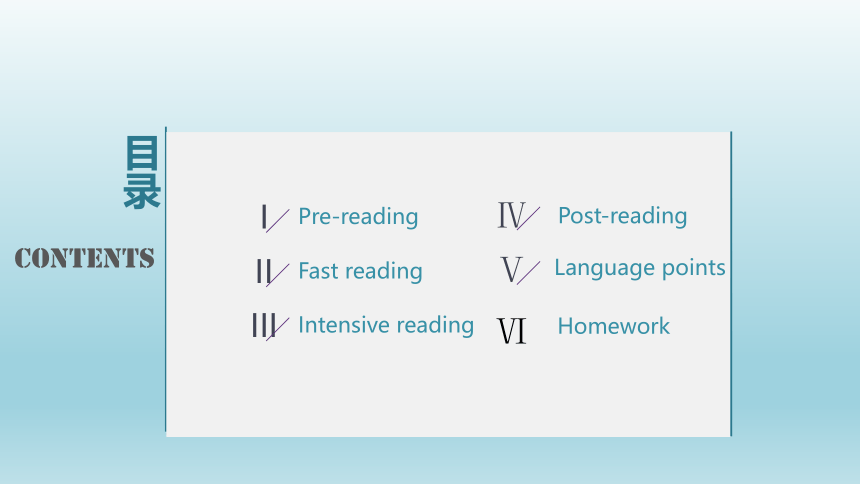

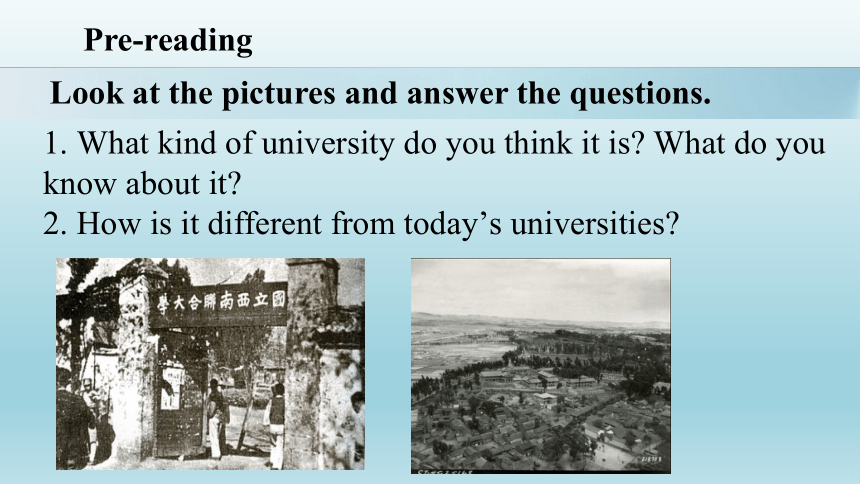
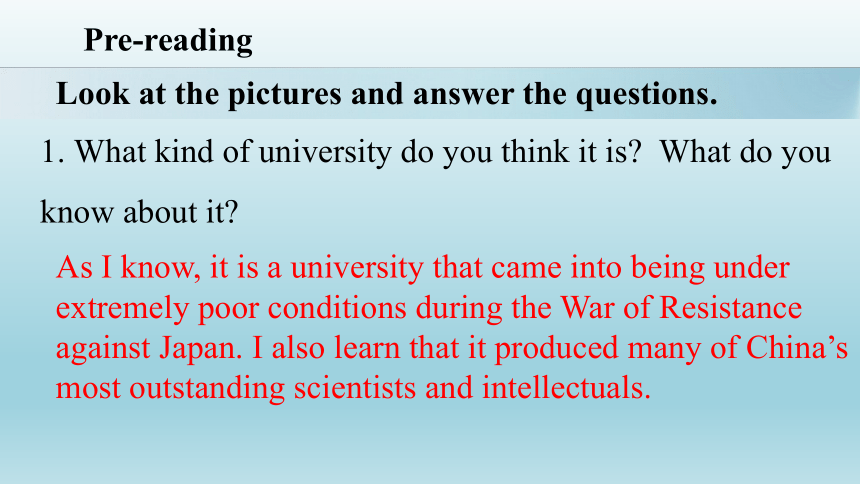
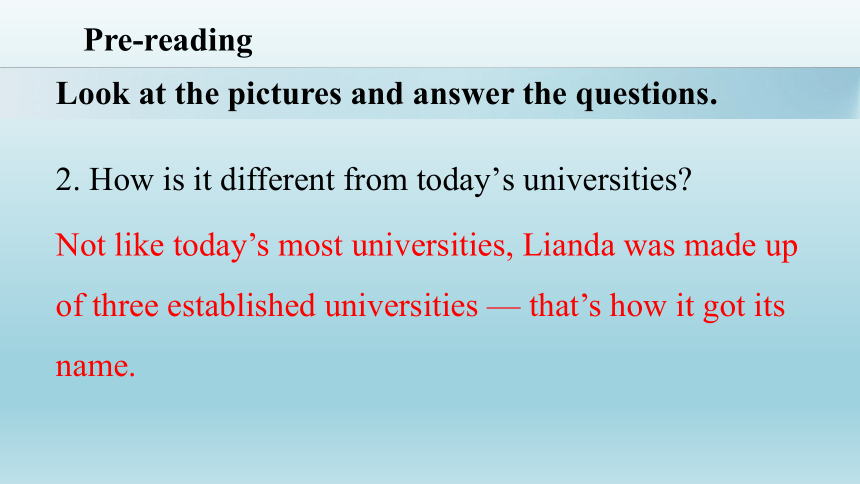

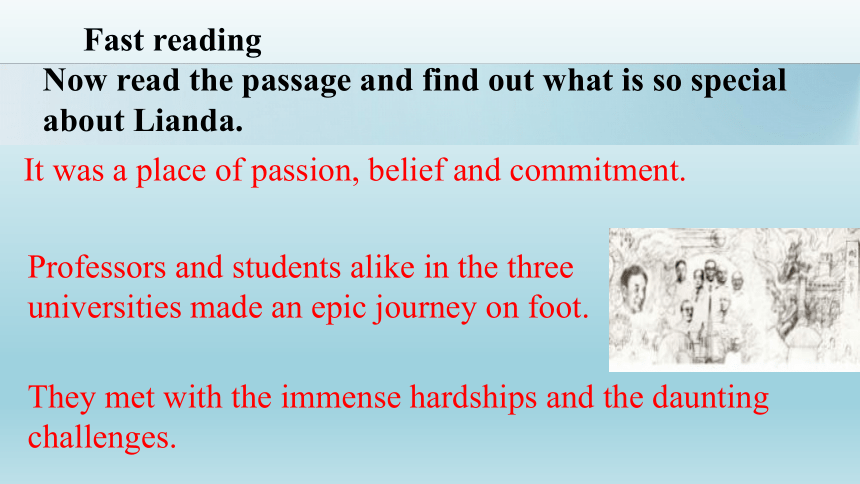
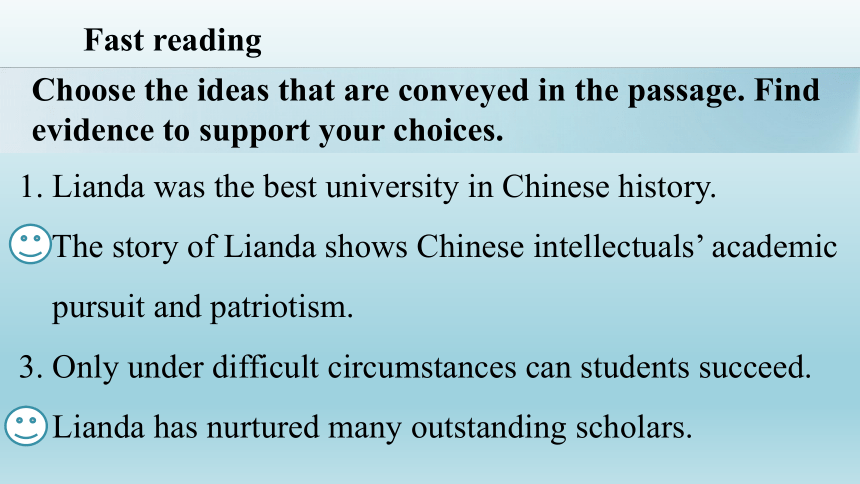
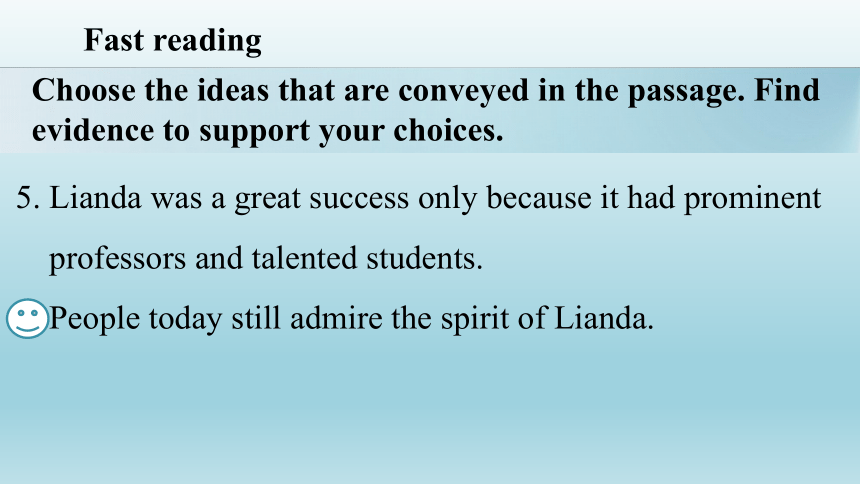
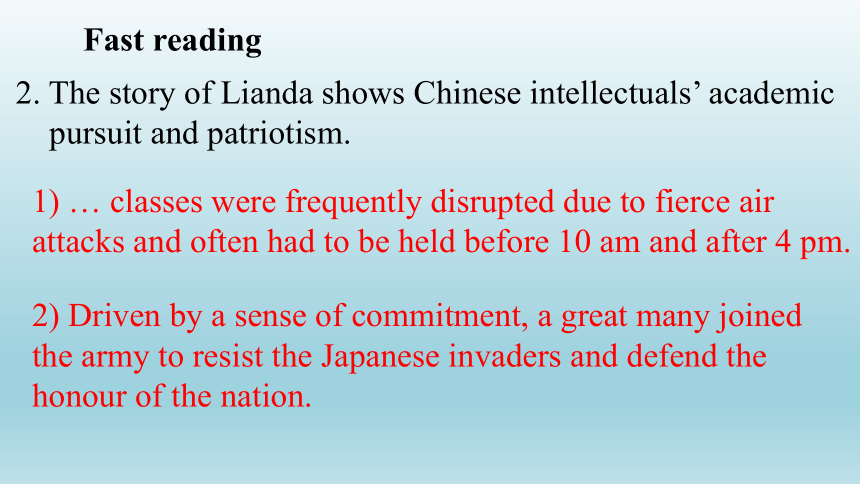
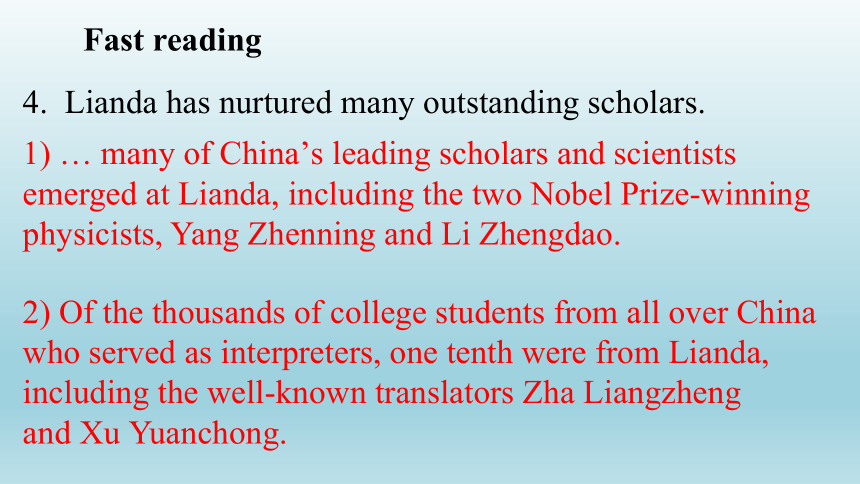
文档简介
(共44张PPT)
Developing ideas — reading
Unit 3 War and peace
目录
contents
Pre-reading
I
Language points
Ⅳ
Fast reading
II
Homework
Ⅴ
Intensive reading
III
Ⅵ
Post-reading
I
Pre-reading
Pre-reading
Look at the pictures and answer the questions.
1. What kind of university do you think it is What do you know about it
2. How is it different from today’s universities
Pre-reading
Look at the pictures and answer the questions.
1. What kind of university do you think it is What do you know about it
As I know, it is a university that came into being under extremely poor conditions during the War of Resistance against Japan. I also learn that it produced many of China’s most outstanding scientists and intellectuals.
Pre-reading
2. How is it different from today’s universities
Not like today’s most universities, Lianda was made up of three established universities — that’s how it got its name.
Look at the pictures and answer the questions.
II
Fast reading
Fast reading
Now read the passage and find out what is so special about Lianda.
It was a place of passion, belief and commitment.
Professors and students alike in the three universities made an epic journey on foot.
They met with the immense hardships and the daunting challenges.
Fast reading
1. Lianda was the best university in Chinese history.
2. The story of Lianda shows Chinese intellectuals’ academic
pursuit and patriotism.
3. Only under difficult circumstances can students succeed.
4. Lianda has nurtured many outstanding scholars.
Choose the ideas that are conveyed in the passage. Find evidence to support your choices.
Fast reading
5. Lianda was a great success only because it had prominent
professors and talented students.
6. People today still admire the spirit of Lianda.
Choose the ideas that are conveyed in the passage. Find evidence to support your choices.
Fast reading
2. The story of Lianda shows Chinese intellectuals’ academic
pursuit and patriotism.
1) … classes were frequently disrupted due to fierce air attacks and often had to be held before 10 am and after 4 pm.
2) Driven by a sense of commitment, a great many joined the army to resist the Japanese invaders and defend the honour of the nation.
Fast reading
4. Lianda has nurtured many outstanding scholars.
1) … many of China’s leading scholars and scientists emerged at Lianda, including the two Nobel Prize-winning physicists, Yang Zhenning and Li Zhengdao.
2) Of the thousands of college students from all over China who served as interpreters, one tenth were from Lianda, including the well-known translators Zha Liangzheng
and Xu Yuanchong.
Fast reading
6. People today still admire the spirit of Lianda.
In 2017, representatives from Peking University, Tsinghua University, Nankai University and Yunnan Normal University gathered to commemorate the 80th anniversary of its founding.
III
Intensive reading
Intensive reading
1. Their bed was the dusty road and their roof was the open sky, …
2. They had to live in rough buildings, packed 40 to a room, like sardines.
Find out what figures of speech are used in the sentences and discuss how they help to express the author’s emotions.
metaphor
simile
Intensive reading
Learning to learn
Similes and metaphors are two commonly used, but easy to confuse, figures of speech. Similes compare and show similarities in typically different things. Similes usually use connecting words such as like, as, so and resemble. For example, He is as cool as a cucumber. Unlike similes, metaphors make direct comparisons without using connecting words. For example, She has a heart of a lion.
Intensive reading
Think and Share
1. What difficulties did the professors and students of Lianda encounter How did they deal with these
2. What is your understanding of the poem written by Zha Liangzheng
3. What contribution did Lianda make to the education of the nation
4. In what ways is the theme of war and peace presented differently in the two reading passages in this unit
Intensive reading:
Think and Share
1. What difficulties did the professors and students of Lianda encounter How did they deal with these
They had to travel a long distance to reach Lianda. Throughout the journey, they had no accommodation and had to survive extreme conditions. Also, the conditions in Lianda itself were very harsh. They did not have enough food and studied in rough buildings. Furthermore, their study was often interrupted by air attacks. They had to adapt to these challenges, for instance, by holding their classes when they were not likely to be bombed.
Intensive reading:
Think and Share
2. What is your understanding of the poem written by Zha
Liangzheng
Softly, on the hillside forgotten by all,
A misty rain falls in a gentle breeze;
There is no trace of the footprints of history;
Where brave souls once stood, breathing new life into the trees.
…… 静静地,在那被遗忘的山坡上,
还下着密雨,还吹着细风,
没有人知道历史曾在此走过,
留下英灵化入树干而滋生。
Intensive reading:
Think and Share
3. What contribution did Lianda make to the education of the nation
Many of China’s leading scholars and scientists came from Lianda, including two Nobel Prize winners. Lianda’ s spirit has become the blueprint for all universities in China in the modern era.
Intensive reading:
Think and Share
4. In what ways is the theme of war and peace presented differently in the two reading passages in this unit
The passage on the D-Day landings focuses on war as a military operation, and on how dead soldiers are memorialised. The passage on Lianda focuses on how war affected China’s students and academics, and how they were able to achieve excellence in spite of the great difficulties.
Ⅳ
Post-reading
Post-reading
Work in groups. Give a talk about the spirit of Lianda.
1. Discuss the questions below.
How can you describe the spirit of Lianda
What examples support your ideas
What can you learn from the story of Lianda
Post-reading
2. Complete the diagram with your ideas and the examples that support them.
Lianda
Spirit: ________________________
Supporting evidence: _____________________
Spirit: ________________________
Supporting evidence: _____________________
Work in groups. Give a talk about the spirit of Lianda.
Post-reading
Work in groups. Give a talk about the spirit of Lianda.
Language points
V
1. emerge v (从隐蔽处或暗处)出现;浮现;露出
Language points: Words
emerge from 从……中出现或显露
emerge out of 来源于
emerge as 作为……出现
练一练:
1) Several facts started to emerge ______ my investigation.
2) The musical forms emerged out ______ the American
black experience.
3) The Pacific region has rapidly emerged ______ a leading
force on the world stage.
from
of
as
2. representative n 代表;代销人
adj 典型的;有代表性的
Language points: Words
1) 来自几个国家的代表出席了谈判。
2) 这个事例典型地反映了警方的态度。
The negotiation was attended by representatives of several states.
This case is a representative of the attitudes of the police.
1. refer to … as … ______________________
2. academic struggles _______________________
3. bring disaster to _______________________
4. save their educational and intellectual heritage
_______________________
5. make an epic journey _______________________
把……称作……
学术斗争
Language points: Important lexical chunks
给……带来灾难
保护文化知识遗产
历经了漫长而艰难的旅程
6. light up the sky _________________
7. a shortage of _________________
8. It is no wonder … _________________
9. lay the foundation for _________________ 10. hold down _________________
Language points: Important lexical chunks
照亮天空
……短缺
给……奠定了基础
难怪……
压住
11. shirk one’s duty _________________
12. a sense of commitment _________________
13. defend the honour of the nation _________________
14. serve as __________________
memorate sth _________________
Language points: Important lexical chunks
推卸责任
一种责任感
担任
捍卫国家荣誉
纪念……
1. Their bed was the dusty road and their roof was the open sky, …
Language points: Important sentences
Paraphrase: Along the journey to Lianda, professors and students had no place to live in and they had to sleep on the road. They were often threatened by the Japanese bombings,
from which they had no protection.
(metaphor)
e.g. 1) Time is money and life is a journey.
2) The world is a big stage and all the men and women
are merely players.
2. They had to live in rough buildings, packed 40 to a room, like sardines.
Language points: Important sentences
Paraphrase: They had to live in very basic buildings, with each room containing 40 people, so that there was very little space for each person.
(simile)
e.g. 1) Marriage is like a beleaguered fortress.
2) I wandered lonely as a cloud.
2. They had to live in rough buildings, packed 40 to a room, like sardines.
Language points: Important sentences
pack v 塞满;挤满
e.g. The sheep had been packed into a truck and transported without food or water.
那些羊被塞入卡车运走,不给吃也不给喝。
3. A product of the war, Lianda is now physically gone. But it has become the crowning glory of China’s modern universities, not only because of its prominent professors and talented students, but also because of the school’s strong spirit of perseverance and dedication.
Language points: Important sentences
Paraphrase: Lianda no longer exists, because it was the war that caused it to be created. But it has become China’s most respected university, not only because of the excellent
professors and students, but also because of the school’s strong values of determination and duty.
3. A product of the war, Lianda is now physically gone. But it has become the crowning glory of China’s modern universities, not only because of its prominent professors and talented students, but also because of the school’s strong spirit of perseverance and dedication.
Language points: Important sentences
physically 表示有形的存在 ; spirit 表示精神上的存在
crowning 使圆满的;使完美的
The hotel’s crowning glory was a stunning roof garden.
这家酒店的点睛之笔是那座令人惊叹的楼顶花园。
4. But it has become the crowning glory of China’s modern universities, not only because of its prominent professors and talented students, but also because of the school’s strong spirit of perseverance and dedication.
Language points: Important sentences
翻译:但它已成为中国现代大学至高无上的骄傲,不仅因其拥有杰出的教授和才华横溢的学生,更因其不屈不挠、无私奉献。
Language points: Important sentences
not only … but also
1)该结构常用来连接并列成分,如两个主语、谓语、宾语、表语、定语、状语或句子,在意义上强调后者,其中also可以省略。
4. But it has become the crowning glory of China’s modern universities, not only because of its prominent professors and talented students, but also because of the school’s strong spirit of perseverance and dedication.
They not only speak the same language but also share a large number of social customs.
他们不但语言相同,而且有很多相同的风俗习惯。
Language points: Important sentences
Light and bright colors make people not only happier but more active.
浅色和鲜艳的颜色不但使人看了高兴,也会使人更加活泼。
Shakespeare was not only a writer but (also) an actor.
莎士比亚不仅是一位剧作家,而且是一位演员。
Language points: Important sentences
2)连接主语时,谓语动词的数遵循就近原则;当 not only 位于句首连接两个句子时,第一个分句要用部分倒装,第二个分句不倒装。
4. But it has become the crowning glory of China’s modern universities, not only because of its prominent professors and talented students, but also because of the school’s strong spirit of perseverance and dedication.
Not only you but also he has saved the boys from the fire.
不仅是你而且还有他从火中救出了那些男孩。
Language points: Important sentences
Not only was he fired, but he was also sent to prison.
他不仅被开除了,还被送进了监狱。
5. It has become part of the collective memory of the Chinese nation, with its spirit as the blueprint for all universities in China in the modern era.
Language points: Important sentences
Paraphrase: All Chinese people have remembered Lianda. Modern Chinese universities are still inspired by Lianda today.
blueprint 意为“蓝图”
The president will offer delegates his blueprint for the country’s future.
总统将向代表们提出他构想的国家未来的蓝图。
Homework
VI
Homework
Write a short passage about the spirit of Linda with 100 words.
Developing ideas — reading
Unit 3 War and peace
目录
contents
Pre-reading
I
Language points
Ⅳ
Fast reading
II
Homework
Ⅴ
Intensive reading
III
Ⅵ
Post-reading
I
Pre-reading
Pre-reading
Look at the pictures and answer the questions.
1. What kind of university do you think it is What do you know about it
2. How is it different from today’s universities
Pre-reading
Look at the pictures and answer the questions.
1. What kind of university do you think it is What do you know about it
As I know, it is a university that came into being under extremely poor conditions during the War of Resistance against Japan. I also learn that it produced many of China’s most outstanding scientists and intellectuals.
Pre-reading
2. How is it different from today’s universities
Not like today’s most universities, Lianda was made up of three established universities — that’s how it got its name.
Look at the pictures and answer the questions.
II
Fast reading
Fast reading
Now read the passage and find out what is so special about Lianda.
It was a place of passion, belief and commitment.
Professors and students alike in the three universities made an epic journey on foot.
They met with the immense hardships and the daunting challenges.
Fast reading
1. Lianda was the best university in Chinese history.
2. The story of Lianda shows Chinese intellectuals’ academic
pursuit and patriotism.
3. Only under difficult circumstances can students succeed.
4. Lianda has nurtured many outstanding scholars.
Choose the ideas that are conveyed in the passage. Find evidence to support your choices.
Fast reading
5. Lianda was a great success only because it had prominent
professors and talented students.
6. People today still admire the spirit of Lianda.
Choose the ideas that are conveyed in the passage. Find evidence to support your choices.
Fast reading
2. The story of Lianda shows Chinese intellectuals’ academic
pursuit and patriotism.
1) … classes were frequently disrupted due to fierce air attacks and often had to be held before 10 am and after 4 pm.
2) Driven by a sense of commitment, a great many joined the army to resist the Japanese invaders and defend the honour of the nation.
Fast reading
4. Lianda has nurtured many outstanding scholars.
1) … many of China’s leading scholars and scientists emerged at Lianda, including the two Nobel Prize-winning physicists, Yang Zhenning and Li Zhengdao.
2) Of the thousands of college students from all over China who served as interpreters, one tenth were from Lianda, including the well-known translators Zha Liangzheng
and Xu Yuanchong.
Fast reading
6. People today still admire the spirit of Lianda.
In 2017, representatives from Peking University, Tsinghua University, Nankai University and Yunnan Normal University gathered to commemorate the 80th anniversary of its founding.
III
Intensive reading
Intensive reading
1. Their bed was the dusty road and their roof was the open sky, …
2. They had to live in rough buildings, packed 40 to a room, like sardines.
Find out what figures of speech are used in the sentences and discuss how they help to express the author’s emotions.
metaphor
simile
Intensive reading
Learning to learn
Similes and metaphors are two commonly used, but easy to confuse, figures of speech. Similes compare and show similarities in typically different things. Similes usually use connecting words such as like, as, so and resemble. For example, He is as cool as a cucumber. Unlike similes, metaphors make direct comparisons without using connecting words. For example, She has a heart of a lion.
Intensive reading
Think and Share
1. What difficulties did the professors and students of Lianda encounter How did they deal with these
2. What is your understanding of the poem written by Zha Liangzheng
3. What contribution did Lianda make to the education of the nation
4. In what ways is the theme of war and peace presented differently in the two reading passages in this unit
Intensive reading:
Think and Share
1. What difficulties did the professors and students of Lianda encounter How did they deal with these
They had to travel a long distance to reach Lianda. Throughout the journey, they had no accommodation and had to survive extreme conditions. Also, the conditions in Lianda itself were very harsh. They did not have enough food and studied in rough buildings. Furthermore, their study was often interrupted by air attacks. They had to adapt to these challenges, for instance, by holding their classes when they were not likely to be bombed.
Intensive reading:
Think and Share
2. What is your understanding of the poem written by Zha
Liangzheng
Softly, on the hillside forgotten by all,
A misty rain falls in a gentle breeze;
There is no trace of the footprints of history;
Where brave souls once stood, breathing new life into the trees.
…… 静静地,在那被遗忘的山坡上,
还下着密雨,还吹着细风,
没有人知道历史曾在此走过,
留下英灵化入树干而滋生。
Intensive reading:
Think and Share
3. What contribution did Lianda make to the education of the nation
Many of China’s leading scholars and scientists came from Lianda, including two Nobel Prize winners. Lianda’ s spirit has become the blueprint for all universities in China in the modern era.
Intensive reading:
Think and Share
4. In what ways is the theme of war and peace presented differently in the two reading passages in this unit
The passage on the D-Day landings focuses on war as a military operation, and on how dead soldiers are memorialised. The passage on Lianda focuses on how war affected China’s students and academics, and how they were able to achieve excellence in spite of the great difficulties.
Ⅳ
Post-reading
Post-reading
Work in groups. Give a talk about the spirit of Lianda.
1. Discuss the questions below.
How can you describe the spirit of Lianda
What examples support your ideas
What can you learn from the story of Lianda
Post-reading
2. Complete the diagram with your ideas and the examples that support them.
Lianda
Spirit: ________________________
Supporting evidence: _____________________
Spirit: ________________________
Supporting evidence: _____________________
Work in groups. Give a talk about the spirit of Lianda.
Post-reading
Work in groups. Give a talk about the spirit of Lianda.
Language points
V
1. emerge v (从隐蔽处或暗处)出现;浮现;露出
Language points: Words
emerge from 从……中出现或显露
emerge out of 来源于
emerge as 作为……出现
练一练:
1) Several facts started to emerge ______ my investigation.
2) The musical forms emerged out ______ the American
black experience.
3) The Pacific region has rapidly emerged ______ a leading
force on the world stage.
from
of
as
2. representative n 代表;代销人
adj 典型的;有代表性的
Language points: Words
1) 来自几个国家的代表出席了谈判。
2) 这个事例典型地反映了警方的态度。
The negotiation was attended by representatives of several states.
This case is a representative of the attitudes of the police.
1. refer to … as … ______________________
2. academic struggles _______________________
3. bring disaster to _______________________
4. save their educational and intellectual heritage
_______________________
5. make an epic journey _______________________
把……称作……
学术斗争
Language points: Important lexical chunks
给……带来灾难
保护文化知识遗产
历经了漫长而艰难的旅程
6. light up the sky _________________
7. a shortage of _________________
8. It is no wonder … _________________
9. lay the foundation for _________________ 10. hold down _________________
Language points: Important lexical chunks
照亮天空
……短缺
给……奠定了基础
难怪……
压住
11. shirk one’s duty _________________
12. a sense of commitment _________________
13. defend the honour of the nation _________________
14. serve as __________________
memorate sth _________________
Language points: Important lexical chunks
推卸责任
一种责任感
担任
捍卫国家荣誉
纪念……
1. Their bed was the dusty road and their roof was the open sky, …
Language points: Important sentences
Paraphrase: Along the journey to Lianda, professors and students had no place to live in and they had to sleep on the road. They were often threatened by the Japanese bombings,
from which they had no protection.
(metaphor)
e.g. 1) Time is money and life is a journey.
2) The world is a big stage and all the men and women
are merely players.
2. They had to live in rough buildings, packed 40 to a room, like sardines.
Language points: Important sentences
Paraphrase: They had to live in very basic buildings, with each room containing 40 people, so that there was very little space for each person.
(simile)
e.g. 1) Marriage is like a beleaguered fortress.
2) I wandered lonely as a cloud.
2. They had to live in rough buildings, packed 40 to a room, like sardines.
Language points: Important sentences
pack v 塞满;挤满
e.g. The sheep had been packed into a truck and transported without food or water.
那些羊被塞入卡车运走,不给吃也不给喝。
3. A product of the war, Lianda is now physically gone. But it has become the crowning glory of China’s modern universities, not only because of its prominent professors and talented students, but also because of the school’s strong spirit of perseverance and dedication.
Language points: Important sentences
Paraphrase: Lianda no longer exists, because it was the war that caused it to be created. But it has become China’s most respected university, not only because of the excellent
professors and students, but also because of the school’s strong values of determination and duty.
3. A product of the war, Lianda is now physically gone. But it has become the crowning glory of China’s modern universities, not only because of its prominent professors and talented students, but also because of the school’s strong spirit of perseverance and dedication.
Language points: Important sentences
physically 表示有形的存在 ; spirit 表示精神上的存在
crowning 使圆满的;使完美的
The hotel’s crowning glory was a stunning roof garden.
这家酒店的点睛之笔是那座令人惊叹的楼顶花园。
4. But it has become the crowning glory of China’s modern universities, not only because of its prominent professors and talented students, but also because of the school’s strong spirit of perseverance and dedication.
Language points: Important sentences
翻译:但它已成为中国现代大学至高无上的骄傲,不仅因其拥有杰出的教授和才华横溢的学生,更因其不屈不挠、无私奉献。
Language points: Important sentences
not only … but also
1)该结构常用来连接并列成分,如两个主语、谓语、宾语、表语、定语、状语或句子,在意义上强调后者,其中also可以省略。
4. But it has become the crowning glory of China’s modern universities, not only because of its prominent professors and talented students, but also because of the school’s strong spirit of perseverance and dedication.
They not only speak the same language but also share a large number of social customs.
他们不但语言相同,而且有很多相同的风俗习惯。
Language points: Important sentences
Light and bright colors make people not only happier but more active.
浅色和鲜艳的颜色不但使人看了高兴,也会使人更加活泼。
Shakespeare was not only a writer but (also) an actor.
莎士比亚不仅是一位剧作家,而且是一位演员。
Language points: Important sentences
2)连接主语时,谓语动词的数遵循就近原则;当 not only 位于句首连接两个句子时,第一个分句要用部分倒装,第二个分句不倒装。
4. But it has become the crowning glory of China’s modern universities, not only because of its prominent professors and talented students, but also because of the school’s strong spirit of perseverance and dedication.
Not only you but also he has saved the boys from the fire.
不仅是你而且还有他从火中救出了那些男孩。
Language points: Important sentences
Not only was he fired, but he was also sent to prison.
他不仅被开除了,还被送进了监狱。
5. It has become part of the collective memory of the Chinese nation, with its spirit as the blueprint for all universities in China in the modern era.
Language points: Important sentences
Paraphrase: All Chinese people have remembered Lianda. Modern Chinese universities are still inspired by Lianda today.
blueprint 意为“蓝图”
The president will offer delegates his blueprint for the country’s future.
总统将向代表们提出他构想的国家未来的蓝图。
Homework
VI
Homework
Write a short passage about the spirit of Linda with 100 words.
